
20 Writers From Around the World on the Olympics
What to Look Forward to And Which Sports are Like Writing
Despite the hurdles confronting this year’s Brazil Olympics, the Games have a wonderful way of bringing people around the world together. We asked twenty authors hailing from all over the globe—from Syria to Spain, from Ecuador to Equatorial Guinea, from Russia to Pakistan to Iceland and many more—about their home countries’ athletic heroes and literary legacies surrounding sports. Some local traditions are familiar to most Olympics viewers—soccer, cycling, and boxing were popular choices—though some, like Uzbek Buzkashi, in which horse-riders fight to grab and then place a goat carcass in a goal, have yet to become canonical. We also asked what sporting event is most apt as a metaphor for the writing process. Diving, equestrian dressage, fencing, and pentathlon all made the cut, but the sport that most unites the writing endeavor across borders is the marathon: arduous, chafing, vomit-inducing, but ultimately triumphant (unless you end up like the world’s first marathoner, and die from the effort). Happy reading, and enjoy tonight’s cerimônia de abertura!
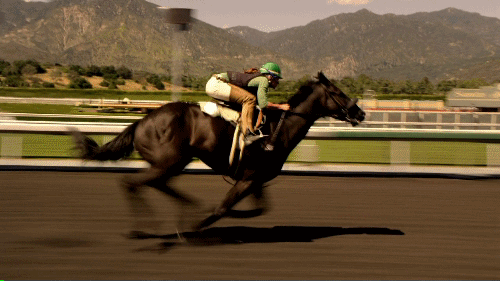
Morocco: Fouad Laroui
What event will you be following most closely during this year’s Summer Olympics in Brazil?
Something to do with horses (I don’t know the technical term). There is a guy from Morocco competing. The horse himself is French… no, wait, horses have no nationality. So, who wins, the man or the beast? Who should get the medal? Whose flag… It’s a philosophical question, isn’t it? Therefore, it’s the perfect excuse to watch sport.
What sport has the most interesting literary tradition in your home country?
Horses. Galloping horses. It’s called t’bourida in Moroccan Arabic. The word comes from baroud, which means powder: The guy on top of the horse usually holds a rifle and shoots in the air at the end of the gallop (no, they don’t shoot their horses). This sport has been practiced for centuries. When the French colonized Morocco, between 1912 and 1956, they changed its name: t’bourida became fantasia. Why? I have no idea. Anyway, it figures in many Moroccan stories, written or oral.
Which of your country’s athletes would make the most compelling hero/ine of a novel or subject of a biography?
Not a horse, but a lady: Nawal El Moutawakel, a former hurdler, who won the inaugural women’s 400 metres hurdles event at the 1984 Summer Olympics, in Los Angeles. She was the first female Arab, Muslim, African, etc. (a lot of adjectives here), to become an Olympic champion. Later she became the Minister of Sports in Morocco. Today she is kind of running the CIO. A nice little biography in waiting… I cannot write it: Nawal is a good friend of mine. Not enough distance.
David Foster Wallace once compared writing to wrestling sheets of balsa wood in a high wind. Which Olympic sport is most like your experience of writing?
Diving. I love writing short stories. The last sentence of a short story should sound like the last millisecond of the dive when the diver hits the water and disappears.
Fouad Laroui (b. 1958) is a Moroccan writer who lives in Amsterdam. Over the past 20 years, Laroui has been consistently building an oeuvre centered around universally contemporary themes: identity in a globalized world, dialogue/confrontation between cultures, the individual vs. the group, etc. With ten novels and five collections of short stories written in French, plus two collections of poems written in Dutch, a play, many essays and scientific papers (written in French or English), his ongoing ambitious literary output has been recognized with many awards, including: Prix Albert Camus, Prix Mediterranée, Prix Goncourt de la Nouvelle, Grande médaille de la Francophonie de l’Académie française, Prix du meilleur roman francophone, Premio Francesco Alziator (Italy), Samuel-Pallache-Prijs (The Netherlands), E. du Perron Prijs (The Netherlands).
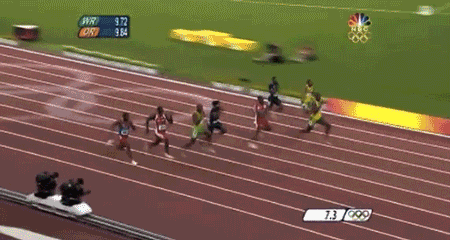 Uzbekistan: Hamid Ismailov
Uzbekistan: Hamid Ismailov
What event will you be following most closely during this year’s Summer Olympics in Brazil?
Most probably the 100m and 200m men’s finals, just to discover whether Usain Bolt is the greatest of stayers among the sprinters.
What sport has the most interesting literary tradition in your home country?
Ulak or Buzkashi among the most physical ones, in which the horse-riders fight to grab and then place a goat carcass in a goal. The founder of the Uzbek school of novelists Abdulla Qadyri (1893-1938) started his literary career in the beginning of the 20th century with a short story called “Ulak”; one of the best modern writers, Tagay Murad (1948-2003), devoted his novella A horse neighing in the dusk to the same sport; I myself started my latest novel Dance of Devils with a chapter describing that fearsome and fiery sport.
As for the intellectual games, chess is the most revered. Once the greatest Uzbek medieval poet, Alisher Navai (1441-1501), was playing a chess-party with his counterpart, a poet called Binai. Navai stretched his leg and unwittingly touched Binai’s hinder-parts, saying jestingly, “It is the sad nuisance of this country that a man can’t stretch his leg without its touching a poet’s backside.” “Nor draw it up again,” retorted Binai.
But, alas, neither of those two sports are Olympic yet… As Navai himself said:
The person with whom I’d like to converse doesn’t pay attention to me,
And I don’t care about those who want to talk to me…
Which of your country’s athletes would make the most compelling hero/ine of a novel or subject of a biography?
Easy-peasy: Oksana Chusovitina: a gymnast who is taking part in her seventh (yes, seventh) Olympics. Born and bred in Uzbekistan, she represented through her long and successful career the USSR, Germany, Russia, and now back to Uzbekistan. Just for her sake I’d add two additional rings to the Olympic chain.
Which Olympic sport is most like your experience of writing?
I think I’ve answered that question in one of my untranslated novels, devoted to my passionate love of football. There’s an Uzbek superstition: Make a wish while you are sneezing. Every time I sneeze I catch myself saying subconsciously, “I’ll play better than Pele.” In that novel, there’s a passage saying, “Imagine your hand replacing your foot. Could you see now that the main part which handles the ball is not a palm, but the backside of your hand? How much could you do with the backside of your hand? Try for instance the easiest—the kids’ game—to keep a handful of pebbles on that side of your hand. You see how difficult it is! Yet as a football player you develop the same ‘backside’ of your feet to the extent that it feels the ball like a pianist’s hands feel the piano keys.” So is the writing: to get the very embodiment of the fluidity in the net against all odds…
Born in an ancient city in what is now Kyrgyzstan, Hamid Ismailov is an Uzbek novelist and poet who was forced to leave his home in Tashkent when his writing brought him to the attention of government officials. Under threat of arrest, he moved to London and joined the BBC World Service, where he is now Head of the Central Asian Service. In addition to journalism, Ismailov is a prolific writer of poetry and prose, and his books have been published in Uzbek, Russian, French, German, Turkish, English and other languages. His work is still banned in Uzbekistan. His book The Underground was published by Restless Books in 2015.
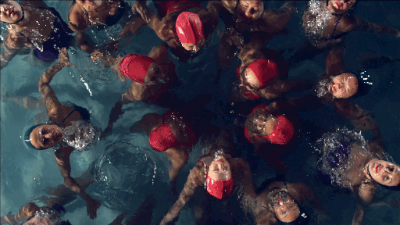 Canada: Sylvia Legris
Canada: Sylvia Legris
What event will you be following most closely during this year’s Summer Olympics in Brazil? “Synchronized swimming. Their eye makeup alone puts the other athletes to shame.
What sport has the most interesting literary tradition in your home country?
Curling. Not as a subject, but more as an underlying principle, the question that drives so many to write in the first place: Broom or Brush? (It’s an altered state of ice thing.)
Which of your country’s athletes would make the most compelling hero/ine of a novel or subject of a biography?
Hands down, golfer Graham DeLaet. Clear-cut to Mountain Man: The Collected Beards of Graham DeLaet. More of a documentary poem, a narrative in verse. One golfer’s follicle chronicles, from Weyburn, Saskatchewan to Rio and all points between.
Which Olympic sport is most like your experience of writing?
Equestrian Dressage. The beautiful, poetic name is a mere ruse de guerre. Strip away the poise and composure and it’s unalloyed lunge whip and half a league, half a league, half a league onward.
Sylvia Legris‘s new book, The Hideous Hidden, will be published by New Directions in September 2016. Her third book, Nerve Squall, won both 2006 Griffin Poetry Prize and the 2006 Pat Lowther Award. Her poems have appeared in The New Yorker, Granta, Conjunctions, Poetry, and The Walrus. Originally from Winnipeg, she lives in Saskatoon where she plays a mean paddle ball.
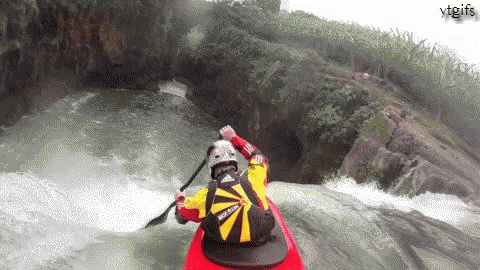 Wales: Cynan Jones
Wales: Cynan Jones
What event will you be following most closely during this year’s Summer Olympics in Brazil?
Kayaking. Two reasons: Cove, my next novel out in the UK this November, is the story of a man who heads out to sea in a kayak and is hit by lightning. Also, when I visited Brazil a few years ago to speak at the Paraty Literature Festival, I skipped meeting the local dignitaries to go kayaking round the coast. What could I do? The kayak was just sitting there, for hire, on the beach…
What sport has the most interesting literary tradition in your home country?
Wales is a tiny country (of around three million people) but we traditionally punch above our weight in rugby. A couple of (relatively) recent titles would be Owen Sheers’s Calon, A Journey to the Heart of Welsh Rugby and Lewis Davies’s Work, Sex and Rugby.
Which of your country’s athletes would make the most compelling hero/ine of a novel or subject of a biography?
This year, a record 30 Welsh athletes compete in the British Olympic Team. In my experience, however, people who have had to focus so hard to achieve the levels of excellence required in sport are often quite boring. Not the stuff of novels… Apart from the boxing and other strong angry fighting ones who might take umbrage at that, of course. They’re really interesting. Really.
Which Olympic sport is most like your experience of writing?
It’s kind of a cross between shot put and high diving.
Cynan Jones was born near Aberaeron on the west coast of Wales in 1975. He is the author of four short novels, The Long Dry, Everything I Found on the Beach, Bird, Blood, Snow and The Dig. His first novel won a Society of Authors Betty Trask Award and saw the author nominated as the 2008 Hay Festival Scritture Giovani. The Dig—a chapter of which was shortlisted for the 2013 Sunday Times EFG Private Bank Short Story Award—won a Jerwood Fiction Uncovered Prize earlier this year. His work has been translated into several languages, and short stories have appeared in a number of anthologies and publications including Granta and New Welsh Review.
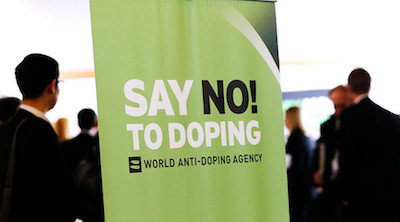
Russia: Oleg Kashin
What event will you be following most closely during this year’s Summer Olympics in Brazil?
The most interesting Olympic event for me has already taken place. This is the conflict between WADA and Russia, the scandal about doping. I was born in the year of the Moscow Olympic Games. These games were boycotted by the United States, Britain, and West Germany because of Soviet aggression in Afghanistan. I trace the current Western “zero tolerance” to the Russian war in the Ukraine to this moment, and I see that not much has changed since then. Political conflicts about sports are the most interesting for me.
What sport has the most interesting literary tradition in your home country?
The most literary sport in Russia is chess. The work of Vladimir Nabokov was banned in the Soviet Union, and his first publication in Russia was a novel about chess published in the chess magazine in 1986. Maybe if it weren’t for chess, still nobody would know Nabokov in Russia.
But if we talk about the Olympic sports, judo is the most literary. The Russian judoka number one is Vladimir Putin. He is engaged in judo and even wrote a book about judo. His co-author has become a billionaire in Putin’s Russia.
Which of your country’s athletes would make the most compelling hero/ine of a novel or subject of a biography?
Elena Isinbayeva, the Olympic champion in the high jump. She is the most successful athlete of my generation. In an interview she talked about how she liked to live in Monaco and feel cosmopolitan. The IOC did not permit her to participate in the Games this year, and now she has taken a hard patriotic line about the new Cold war with the West. Several days ago I saw a picture of her in military uniform. Putin gave her the rank of Major. Now she is an officer. This is metamorphosis, like in Kafka.
Which Olympic sport is most like your experience of writing?
My sport (now) is the marathon, although I’m a sprinter by nature. I love short texts very much, and a long book is very hard for me. But I’m learning and trying. I want to be a great Russian writer.
Oleg Kashin, formerly a special correspondent and blogger for the Russian daily newspaper and media company Kommersant, is well known for his bold reporting on Russian politics and business. Kashin was nearly beaten to death in 2010 over his political reporting. Kashin now travels to Russia frequently and occasionally writes on Russian affairs, but resides in Switzerland with his wife. Kashin was a Paul Klebnikov Civil Society Fellow at Columbia University’s Harriman Institute in 2012. His first novel Fardwor, Russia!: A Fantastical Tale of Life under Putin was released in English in Fall 2015.
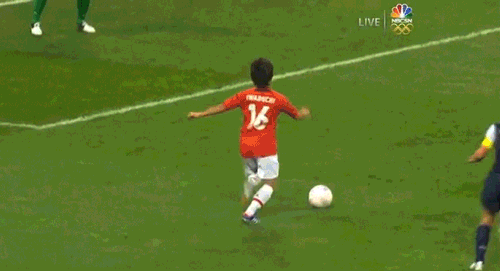
Syria: Osama Alomar
Translated by C. J. Collins
What event will you be following most closely during this year’s Summer Olympics in Brazil?
Soccer. It’s my favorite game.
What sport has the most interesting literary tradition in your home country?
Of all the interesting literary traditions from Syria, I can think of none that has to do with sports. We write about suffering, about love, about war, oppression, hope, optimism, pessimism. But not sports.
Which of your country’s athletes would make the most compelling hero/ine of a novel or subject of a biography?
The soccer player Walid Abu Al-Sul from the southern Syrian city of Dara’a pulled himself up from a very poor environment. With no formal training or team experience, he had the self confidence to seek a personal interview with the president of the Syrian National Athletic Union telling him about his skills, and asking the president to let him try out. To everyone’s surprise, what he claimed was true. A new talent in soccer was discovered. He became a star on the Syrian national team.
Which Olympic sport is most like your experience of writing?
For me, writing feels like volleyball. The idea is like the ball. I have to keep it flying through the air. If it hits the ground, it’s finished.
Born in Damascus, Syria in 1968 and now living in Chicago, Osama Alomar is the author of three collections of short stories and a volume of poetry. He is a regular contributor to various newspapers and journals within the Arab world.
 Iceland: Sjón
Iceland: Sjón
What event will you be following most closely during this year’s Summer Olympics in Brazil?
I prefer individual sports to team sports and like to watch everything from weightlifting to gymnastics, swimming to pole-vaulting. There is something primeval about the joy of watching individuals overcome the laws of nature through strength, speed or lightness—or all three. At the risk of ridicule I confess that of all of these I will follow the female gymnastics closest. Since childhood I have admired the determinedness and skill of the young women who compete in this field. They have the bodies of butterflies and the minds of tigers.
What sport has the most interesting literary tradition in your home country?
Icelandic literature is actually quite poor when it comes to sports. For some reason they have not become a metaphor of choice for our literary authors. But in literature for children and young adults soccer has featured prominently. The reason might be that professional sports only recently became a part of our society and therefore of the adult world. This might change now as the stakes are getting higher with money and fame playing an ever bigger role.
Which of your country’s athletes would make the most compelling hero/ine of a novel or subject of a biography?
Like in other countries, the best sports stories have as their protagonist a flawed hero, someone who achieves greatness and then falls from grace. In Icelandic history we have a few of those and I would like to explore the life of Gunnar Huseby, an athlete who was the country’s first international sportsman after it gained independence from Denmark in 1944. Taking part in throwing events, shot put, and discus throw, he won two gold medals at the European Athletics Championships in 1946 and 1950. At the height of his career, due to his struggle with alcoholism, he missed his two chances of taking part in the Olympics, first in the London games in 1948 and then in Helsinki in 1952 when he was serving a twelve-month jail sentence for assault and robbery. The story goes that Huseby was a true natural who never trained properly and barely sobered up for the championships where he kept winning and breaking national and continental records. There is a fable in his story. I am not sure what it is, but I know I would find it out by writing it.
Which Olympic sport is most like your experience of writing?
As a teen I competed in long jump and triple jump—I held the Icelandic record in triple jump from a fixed position for years—and based on that experience I would like to compare writing to the latter. There is the run up, calculated to bring your foot to the exact spot on the plank for the “take-off,” the middle jump, finely measured for the build up to the third, last and big one. Then you have the floating over the sand pit where you stretch your body in the air before folding it up for the landing—movements that aim for defying gravity and in my memory are moments where I achieved just that, ever so briefly—once there, sitting in the sand, you turn around and look back over the distance you traveled. Finally there is the referee’s announcement of how you did, which may or may not correspond to how you felt while doing the jump.
Sjón‘s latest novel, Moonstone, was released by FSG on August 2. Born in Reykjavik in 1962, he is an award-winning novelist, poet, and playwright. His novels, which include The Whispering Muse, The Blue Fox, and From the Mouth of the Whale, have been translated into thirty-five languages. Alongside his work as a writer, Sjón has taken part in a wide range of art exhibitions and music events. His longtime collaboration with the Icelandic singer Björk led to an Oscar nomination for his lyrics for the Lars Von Trier movie Dancer in the Dark. He lives in Reykjavik.
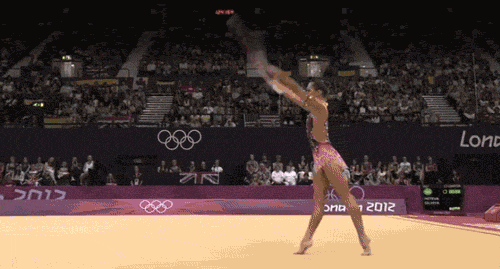 Chile: Lina Meruane
Chile: Lina Meruane
What event will you be following most closely during this year’s Summer Olympics in Brazil?
My favorite competition is gymnastics, both artistic and rhythmic. In gymnastics class, throughout my school years, girls were obliged to perform in all of those routines, and I was terrible at all of them. I know what it takes to be graceful and to remember the choreography, because I never could. So now, in a perverse way, I both enjoy and suffer watching the competition.
What sport has the most interesting literary tradition in your home country?
Football (soccer in the US) seems to be the only sport that matters both on the field and in writing, in Chile and elsewhere in Latin America. Many writers have made of it the theme of novels and chronicles. But I can´t judge their quality, nor recommend any: I’ve never been interested in fútbol writing.
Which of your country’s athletes would make the most compelling hero/ine of a novel or subject of a biography?
Without a doubt, Manuel Plaza, a skinny marathonist who ran in the 1928 Amsterdam Olympic Games and won the first medal for Chile. It was a silver medal, though. The legend has it that because he came from the working class, he was unable to read the signs in English and got detoured at the very end of the race. When he finally made it to the stadium, he was 26 seconds behind the African-born French runner, Ahmed Boughéra El Ouafi.
Which Olympic sport is most like your experience of writing?
Writing feels to me like running alone a long-distance race. Because of my work schedule (as a professor), when I get a few months off, I practice intensive writing and get cramps all over my body. I am completely worn out by the end of a novel, with the sense that I haven’t trained properly and have lost my mind….
Lina Meruane is one of the most prominent female voices in Chilean contemporary literature. A novelist, essayist, and cultural journalist, she is the author of a host of short stories appeared in various anthologies and magazines in Spanish, English, German and French. She is the winner of the Anna Seghers Prize, awarded to her by the Akademie der Künste, in Berlin, Germany, 2011, and received the prestigious Mexican Sor Juana Inés de la Cruz Prize in 2012 with the publication of her most recent novel Seeing Red. Meruane has received writing grants from the Arts Development Fund of Chile (1997), the Guggenheim Foundation (2004) and National Endowment for the Arts (2010). Meruane received her PhD in Latin American Literature from New York University, where she currently teaches World & Latin American Literature and Creative Writing.
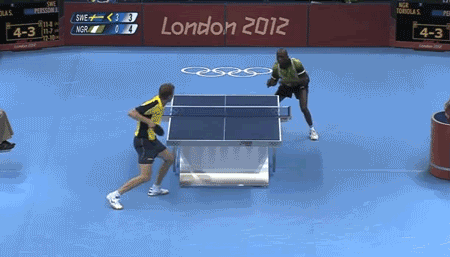 Pakistan: Musharraf Ali Farooqi
Pakistan: Musharraf Ali Farooqi
What event will you be following most closely during this year’s Summer Olympics in Brazil?
The Olympics is the closest thing to a first-class circus. I will be watching gymnastics, tug of war, figure skating, weightlifting, and equestrian sports. Also Judo, boxing, and Taekwondo. And please put table-tennis in too, as I was a junkie once. I think the rest of the guys are just wasting their time.
What sport has the most interesting literary tradition in your home country?
Greco-Roman wrestling. And here’s the plug for Between Clay and Dust, my novel about the wrestling world in a culture and society undergoing change. Field hockey is Pakistan’s national sport but I cannot recall anything written about it in a literary way.
Which of your country’s athletes would make the most compelling hero/ine of a novel or subject of a biography?
I think the greatest athlete Pakistan ever produced was the squash legend Jahangir Khan. Quoting his Wikipedia entry here, “He won the World Open six times and the British Open a record ten times. From 1981 to 1986, he was unbeaten in competitive play. During that time he won 555 matches consecutively, the longest winning streak by any athlete in top-level professional sports as recorded by Guinness World Records.” There’s a sports legend for you.
Which Olympic sport is most like your experience of writing?
Is card sharping an Olympic sport yet? Is poker?
Musharraf Ali Farooqi is an author, novelist, and translator. He was born in 1968 in Hyderabad, Pakistan, and now divides his time between Toronto and Karachi. His acclaimed new novel, Between Clay and Dust, was shortlisted for The Man Asian Literary Prize 2012 and longlisted for the 2013 DSC Prize for South Asian Literature. Farooqi’s second novel, The Story of a Widow, was shortlisted for the DSC Prize for South Asian Literature 2011 and longlisted for the 2010 IMPAC-Dublin Literary Award. His most recent children’s fiction is the novel Tik-Tik, The Master of Time, Pakistan’s first English-language novel for children. He is the author of the critically acclaimed translations of Urdu classics, The Adventures of Amir Hamza, and the first book of a projected 24-volume magical fantasy epic, Hoshruba.
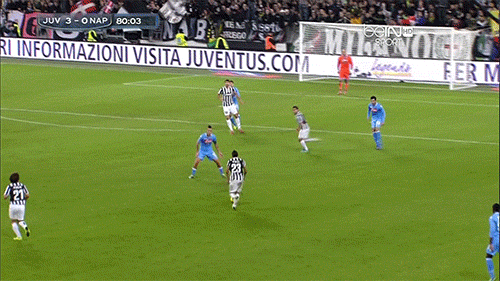 Ecuador: Mauro Javier Cardenas
Ecuador: Mauro Javier Cardenas
What event will you be following most closely during this year’s Summer Olympics in Brazil?
I never wanted to become an Olympic soccer player, but while I lived in Guayaquil, Ecuador, not only did I play soccer every day, I would train myself as if readying for the Olympics, although I think my goal was limited to becoming the best player at my Jesuit high school (I wasn’t), and yet for too many reasons I won’t go into here, as soon as I arrived to the United States after graduating from high school, I stopped playing and watching soccer (for almost 20 years), and so now that I’ve rediscovered soccer again (due to perhaps nostalgia), watching soccer for me is like being a high school kid from Guayaquil again, a kid who wants to watch Neymar’s spectacular dribbles at the Summer Olympics in Brazil so that he can imagine he’s Neymar (without admitting it to himself, of course) during his pickup games after work at a seven-aside turf field in San Francisco.
What sport has the most interesting literary tradition in your home country?
Graft. It pays off.
Which of your country’s athletes would make the most compelling hero/ine of a novel or subject of a biography?
Jefferson Perez, Ecuador’s sole Olympic medalist for race-walking. Jefferson sold newspapers on the streets of Cuenca to help his blind mother, entered race-walking so they wouldn’t fail him at school, dedicated his major victories to his dead father, started a foundation to help children after he retired. I think I just found the subject of my third novel. Thanks, Lit Hub.
Which Olympic sport is most like your experience of writing?
Writing a novel is like swimming, Alan Cheuse said to me in the year 2002, when I still young and wild and full of mope, meaning, I think, that writing a novel is a constant stream of effort, one stroke at a time, or perhaps meaning you can’t write a novel unless you submerge yourself in fiction, or don’t drown, Cardenas, or avoid the high winds and the balsa wood by staying in your pool. Rest in peace, dear Alan.
Mauro Javier Cardenas is the author of The Revolutionaries Try Again, forthcoming from Coffee House Press on September 6th, 2016. Follow him @ineluctablequak.
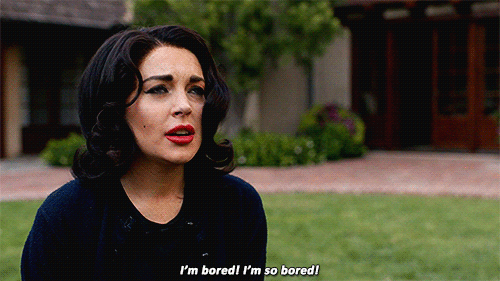
Spain: Toni Sala
What event will you be following most closely during this year’s Summer Olympics in Brazil?
I’m sorry, but none. I’m not interested in them.
What sport has the most interesting literary tradition in your home country?
I was going to say “exile,” but I think that football surpasses this, specifically because of the presence of Barcelona Football Club in Catalonia. With every year comes the release of some Catalan book where the author talks about his sentimental experiences in the Barcelona stadium.
Which of your country’s athletes would make the most compelling hero/ine of a novel or subject of a biography?
The Catalans have no Olympic team, so I’ll say Kilian Jornet, who does miracles. This August he’ll climb Everest without artificial oxygen nor fixed ropes.
Which Olympic sport is most like your experience of writing?
Swimming (because of the solitude, endurance, and mental strength) and riding (because when writing you ride a horse that you will never master). So you must jump in the pool riding that horse and try to make it across in record time.
Toni Sala is the author of over a dozen novels and works of nonfiction, including The Boys, published last year by Two Lines Press. In 2005 he was awarded the National Literature Prize by the Catalan government, and he has also received many other honors for his writing. He lives in Barcelona.
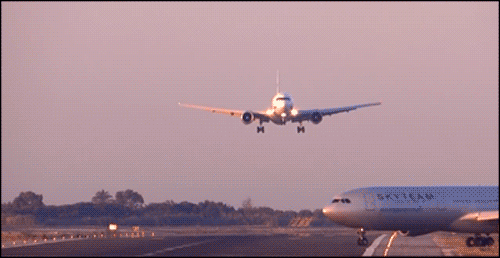
Canada: Ray Robertson
What event will you be following most closely during this year’s Summer Olympics in Brazil?
Which athletes decide not to come and which ones will leave once they’re there.
What sport has the most interesting literary tradition in your home country?
Hockey. Damn ice keeps melting during the summertime, though. I’m sure in Brazil it’ll be different.
Which of your country’s athletes would make the most compelling hero/ine of a novel or subject of a biography?
56-year-old Lesley Thompson-Willie, coxswain of the women’s eights rowing team. This will be her eighth Olympic Games. I’m fifty and just published my tenth book, although I’ve yet to receive a medal.
Which Olympic sport is most like your experience of writing?
As a novelist, it would have to be the marathon: It takes a long time, it’s extremely lonely, and you feel like you’re going to die when you get to the finish line.
Ray Robertson is the author of the novels Home Movies, Heroes, Moody Food, Gently Down the Stream, What Happened Later, David, and I Was There the Night He Died, as well as two books of nonfiction, Mental Hygiene and Why Not? Fifteen Reasons to Live. His most recent book, a collection of essays entitled Lives of the Poets (with Guitars), was published this spring. Born and raised in Southwestern Ontario, he lives in Toronto.

Iceland: Oddný Eir
What event will you be following most closely during this year’s Summer Olympics in Brazil?
I’ll be following most closely the women’s heptathlon (what an interesting word!), especially the javelin throw. We have two javelin heroes now in Iceland. Then I’ll be watching as much as fencing as I can, with the motto of The Three Musketeers in my mouth: All for one, one for all!
What sport has the most interesting literary tradition in your home country?
Iceland is an island and besides the sea we have a lot of glacial rivers so many of our stories are about swimming, not very synchronized, but rather like the desperation of not drowning. We got bridges very late in Iceland so the horse riding was just as important as swimming. Our horse is a special species, small, thick and furry, but in the summertime he throws off the fur to fuck and play. Cross-country skiing and ice-skating are also common in our literature and all the poets do ice-skating on animal bones. In our old rhymes the special type of Icelandic wrestling was a popular theme, and it has an erotic angle, homoerotic. Yes, well, this is our bodily bond to literature.
Which of your country’s athletes would make the most compelling hero/ine of a novel or subject of a biography?
In the mighty Special Olympics, there were two Icelandic women who went to win the gold for ice-skating. They didn’t win, but returned as heroes all the same.
Which Olympic sport is most like your experience of writing?
The whole of the heptathlon and then the trampoline. And also fencing, when I’m with the proofs. The other night, I dreamt that I held the stick of Taekwondo. It’s a cane or a staff, and I wasn’t using it in combat, but trying to write with it. Woke up needing ink.
Icelandic author Oddný Eir’s Land of Love and Ruins won the EU Prize for Literature and the Icelandic Women’s Literature Prize. She has received advanced degrees in political philosophy from the University of Iceland and The Sorbonne. In addition to publishing four novels and several books of poetry and essays, she has worked in the art world as a lecturer and gallerist, has received a grant to study archives and museums in Iceland, has been an environmental activist, and has collaborated with the musical artist Björk in composing lyrics for her albums Biophilia and Vulnicura. Oddný Eir lives in the Icelandic countryside, by the glacier Eyjafjallajökull.

Equatorial Guinea: Recaredo Silebo Boturu
What event will you be following most closely during this year’s Summer Olympics in Brazil?
Because of the time difference it will be difficult to follow any game or competition live, but I can assure you that from here we’ll be watching them with a slight delay: soccer, tennis, and basketball most of all.
What sport has the most interesting literary tradition in your home country?
In Malabo, for example, they tell you and you will meet men who did amazing things with the soccer ball and in the boxing ring, but those men had an eternally difficult time.
Which of your country’s athletes would make the most compelling hero/ine of a novel or subject of a biography?
A runner named José Luis Ebatela who lives with many difficulties in Sampaka. I’ll tell you an anecdotal event: some years ago, Ebatela was training between Sampaka and Malabo. He had won almost all of the national competitions and many of those in the Central African subregion. He trained so much that he got to participate in an athletic competition in Madiba’s country. When the moment came, he traveled to the country and couldn’t compete because the federation didn’t anticipate the low temperatures.
Which Olympic sport is most like your experience of writing?
I wouldn’t know how to pick just one sport, because all of them require skill, discipline, practice, and technique.
Recaredo Silebo Boturu is a playwright, poet, and short story writer in Equatorial Guinea. His work has appeared in translation in the magazines Modern Poetry in Translation and World Literature Today, as well as the anthologies Africa 39 and The World Record, an anthology featuring a poem from each competing Olympic nation. He lives in Malabo, where he directs the theatre company Bocamandja.

Sweden: Martin Holmén
What event will you be following most closely during this year’s Summer Olympics in Brazil?
It’s not going to be that close because of the time difference, but I always keep an eye on boxing and soccer.
What sport has the most interesting literary tradition in your home country?
There seems to be a connection between writers and boxers in Sweden, but back in the day, we also had quite a few writers who were into wrestling. Then again, the autobiography of footballer Zlatan Ibrahimovic, simply titled Zlatan, was one of the biggest, best-selling books in our literary history.
On a separate but related note, literature as a sport was introduced in the Stockholm Olympics of 1912 with the addition of a poetry competition. The winning poem was called “Ode to sport” by pseudonyms M. Eschbach and G. Hohrod of Germany. Years after the death of Pierre de Coubertin, the founder of the modern Olympic games, it was revealed that he, himself, had written the piece in question.
Which of your country’s athletes would make the most compelling hero/ine of a novel or subject of a biography?
I would say boxer Anna Laurell Nash. Not only is she an outstanding athlete, who has done a lot for female boxing here in Sweden, but she also holds a PhD in Chemistry, thereby challenging the stereotypes surrounding boxers.
Which Olympic sport is most like your experience of writing?
Boxing, once again. My anti-hero Harry Kvist is an ex-boxer turned debt collector, so I wanted my writing to reflect the movements of boxing. While maintaining the rhythm and pace of the story, I waited for the right moment to make a move. Whenever that moment emerged, I allowed the language to explode with something new, like an unusual metaphor, hopefully creating a fresh, unexpected twist. My goal is to go high and low without disrupting the harmony, or flow, of the writing.
Martin Holmén studied history, and now teaches at a Stockholm secondary school. Clinch is his first novel, and the first installment in the planned trilogy about Harry Kvist (published in English by Pushkin Press).

United Kingdom: Jon Day
What event will you be following most closely during this year’s Summer Olympics in Brazil?
The Olympics are the only time I get to watch a week’s worth of track cycling, and in recent years British riders have been pretty good at it, so that will be my focus. I’d like to think, post-Armstrong, that it’s less of a target for dopers than other sports, too, though this is probably wishful thinking.
What sport has the most interesting literary tradition in your home country?
Football (soccer) is the UK’s national sport, and has been written about superbly by David Peace. More recently, Anthony Cartwright’s Iron Towns explored the mythic and tribal substrata of the sport.
Which of your country’s athletes would make the most compelling hero/ine of a novel or subject of a biography?
Though he’s had his moment in the sun, the cyclist Bradley Wiggins is still a pretty exciting proposition: stubborn, angry, committed, and possessed of some style, he’s everything you want in a conflicted hero.
Which Olympic sport is most like your experience of writing?
Probably something that is more arduous than it looks and which has ridiculously petty rules that you must take seriously—maybe speed walking, or curling, or modern pentathlon.
Jon Day is a writer, academic and cyclist. He worked as a bicycle courier in London for several years, and is now a lecturer in English Literature at King’s College London. He writes for the London Review of Books, n+1, The New Statesman, and others, and is a regular book critic for the Financial Times and The Telegraph. He is a contributing editor of the Junket, an online quarterly, and he is a Man Booker Prize judge. His book, Cyclogeography: Journeys of a London Bicycle Courier (Notting Hill Editions), is forthcoming in the US this September.

Spain: Marc Pastor
What event will you be following most closely during this year’s Summer Olympics in Brazil?
I probably won’t follow the whole competition of any particular sport, but I do like watching the finals if they’re on TV (and my three-year-old kid isn’t around to demand my attention). I’d like to watch the 100m final, just to see if Usain Bolt smashes another record or if Justin Gatlin can defeat him.
What sport has the most interesting literary tradition in your home country?
In my country, sports aren’t very present in literature. If there is one, though, it would be soccer—absolutely—which often serves as a backdrop in crime fiction.
Which of your country’s athletes would make the most compelling hero/ine of a novel or subject of a biography?
I don’t know very much about the Catalan sportsmen and sportswomen who will be in Rio. Anybody could be a compelling hero/ine if you have a way with writing.
Which Olympic sport is most like your experience of writing?
Running—running a marathon, that is. You run and run and run, but you never seem to arrive at the finish line. Your feet get sore and blistered, and, still, you run. You want to quit, but you know you have to finish because stopping would mean failing. Your nipples start to bleed—well, maybe that doesn’t happen when you write. It’s a long race against yourself, and mental strength is as important as wearing good shoes.
Marc Pastor studied criminology and crime policy, and works as a crime-scene investigator in Barcelona. He is the author of four novels: Montecristo, Barcelona Shadows, awarded the Crims de Tinta prize in 2008, L’any de la plaga and Bioko. His work spans a range of genres, from Sci Fi to Gothic via the adventure novel. Barcelona Shadows, from Pushkin Press, is his first book published in English.
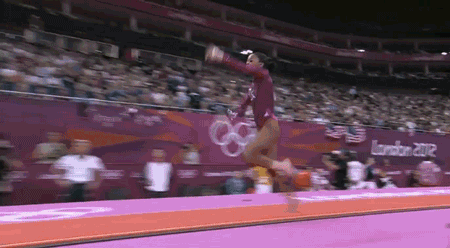
Puerto Rico: Carlos Fonseca
What event will you be following most closely during this year’s Summer Olympics in Brazil?
Since I was a kid, I have always been amazed by gymnasts. I think it is in gymnastics that the pairing of art and sports, of grace and athleticism, becomes most evident. Gymnastics calls for a mixture between technique and spontaneity similar to that required by the arts. I will also be following closely a Puerto Rican athlete: Javier Culson, who four years ago won a bronze medal in 400 meters with hurdles. I love, within track and field, sprint races, mainly because I like the idea of an athlete practicing for years in order to compete in a race that lasts less than a minute. There seems to me a poetic intensity in it: the idea of reducing life to a single instant.
What sport has the most interesting literary tradition in your home country?
Both baseball and boxing have attracted the attention of Puerto Rican writers, as they are the two main sports practiced in the island, alongside basketball. I still remember with gratitude that as a young kid growing up in the 1990s—during the heyday of Puerto Rican baseball—I used to go see legendary players like Roberto Alomar, Bernie Williams, and Iván Rodríguez when they came to the island to participate in the local Winter Season. It was strange to see these giants there, so close to all of us, who, during the rest of the year, I’d watched on television, playing in what then seemed to me such a distant place: the United States. I remember reading, just for fun, Edgardo Rodriguez Juliá’s Peloteros during those years: a wonderful set of profiles and chronicles around key players in Puerto Rico’s baseball history. I also remember hearing the radio narrative of Félix “Tito” Trinidad’s mythic boxing fight against Óscar de la Hoya, which Trinidad won by a majority decision. I remember thinking, without noticing exactly what that would mean for me, that the role of the narrator was central. Later, I would realize that narrators are a key component of sports broadcasting, and that writers have much to learn from them, from the way they are able to construct a communal horizon of expectations, fears, and illusions. More than once, I have thought that it would be interesting to get a bunch of writers to write about their favorite sports narrators or commentators.
Which of your country’s athletes would make the most compelling hero/ine of a novel or subject of a biography?
I think that Roberto Clemente—often considered the greatest baseball player in Puerto Rican history—would make a great protagonist in a novel. I often think that in a Puerto Rican version of Don Delillo’s Underground, the novel would definitely begin with Clemente at bat, not with the Giants versus Dodgers game. Not only was Clemente’s death shocking, as he died in 1972 in a plane crash, while in route to deliver aid to earthquake victims in Nicaragua, but his life coincided with a series of decisive moments within Puerto Rican history: the rise and decline of nationalist fervor, the establishment of a new political relationship with the United States, the massive migration of Puerto Ricans to the United States in the 1950s, and the emergence of salsa as a new hybrid cultural phenomenon. I think that perhaps a novel could be constructed around these events, taking Roberto Clemente as the central protagonist around which to build the novel as a historical kaleidoscope.
David Foster Wallace once compared writing to wrestling sheets of balsa wood in a high wind. Which Olympic sport is most like your experience of writing.
I like to think of writing in boxing terms. Just like the boxer must learn to measure the rhythm of his opponent, in order to skillfully dance around it, just to get back at him at the right instant, the writer must learn how best to move around the type of language that each novel prompts. The writer must learn to expose himself to language and its dangers, just to get back at it with a stronger response. Timid boxers don’t win battles, just like shy writers don’t write great books: writing should always be a boxing match with language. Each novel is a like a new fight, bringing with it new rhythms and new constraints. True writing is knowing how to react to new conditions and new stories.
Carlos Fonseca was born in Costa Rica in 1987 and grew up in Puerto Rico. His work has appeared in publications including The Guardian, BOMB, The White Review and Asymptote. He currently teaches at the University of Cambridge and lives in London.
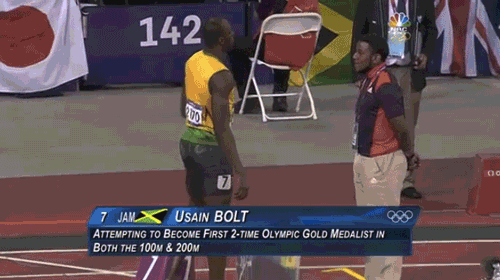
France: Alain Gillot
What event will you be following most closely during this year’s Summer Olympics in Brazil?
On August 14th, 2016, when night falls on the Olympic stadium, when the finalists of the 100 meter dash enter the arena, we will witness the epilogue of an unusual battle between two of the greatest athletes of all time. For a few seconds, the whole world will stop, fascinated, to watch the outcome of this decade-spanning battle. It is a duel fought at a distance, as only one protagonist will be on the track. The other will be in the stands, an observer, or maybe even far from the stadium, shielding himself from the crowd’s gaze to avoid questions, the humiliation of having to answer them in case of defeat. What kind of battle is this? Who are the adversaries? I’m talking about the decade-spanning battle between Frederick Carlton Lewis, now 55 years old, and Usain Bolt, 30 years old. Because these two are not just fighting for victory, one tenth of a second faster or slower, they are fighting, they have always fought, for the legend. If Bolt wins, he will be the Olympic champion of the 100 meter dash for the third consecutive time, a feat no one before him has ever accomplished. Three Olympics, three gold medals in the most glorious discipline. The perfect symbol of a champion. The ultimate dream that Carl Lewis wasn’t able to accomplish, despite his long career. Which means that if Bolt wins, he will be guaranteed a definitive place in the pantheon of sports.
And don’t think it a personal fantasy to pit them against each other. They themselves have done it, constantly, over the past few years. Especially Lewis. Multiplying the jabs at and reservations about his rival’s qualities. And this is probably what makes the duel at a distance so delicious. Because aside from pure talent and the will to endure, these two giants have nothing in common. Who will win on August 14th? The perfect man who watched his races and saw himself surrounded by cheaters, but never by equals? Or the smiling assassin from Jamaica, who openly displays his pleasure and is so good at sharing it with the crowd? That is the magic of the 100 meter dash. Its devastating dramaturgy.
What sport has the most interesting literary tradition in your home country?
It’s difficult to name a great French contemporary novel about sports! Meanwhile, the battle of the 20th century between Ali and Foreman, as described by Norman Mailer, is inscribed in popular memory. Everywhere in the world, the story of the crazy love between Edith Piaf and boxer Marcel Cerdan would have made a great novel! Where is this great French sports novel? Les Forcats de la route (Slaves of the Road), a chronicle of the Tour de France written with panache by the great Albert Londres between the World Wars, was for a long time the model of sports literature in France. And in the hands of the subtle Antoine Blondin, cycling is still the main source of material for the sports novel, over the course of his reporting published in the national sports paper, L’Equipe. But of tragedy, of picaresque comedy, nothing. Sports literature is regarded with a certain contempt in France, like in no other country I’ve been able to visit. But maybe this is only the reflection of a more general state of mind. Who boos at the national team after the first defeat? The French. Who tells his son that sports aren’t a career? The Frenchman. I experienced this throughout my childhood, when playing sports was considered a waste of time. True, sociologists claim that Nazism plays a big role in the French’s defiance of sports. They claim that Hitler’s regime and his cult of the body accelerated the separation of body from spirit in post-war French society, in education as well as culture. It’s an interesting theory. But it’s a dramatization. Starting in school, sports in France are still considered “superfluous.” While in most European countries, sports claim their own place. Perhaps sports confront the damaging characteristic of the French, their individualism, their difficulty accepting common rules. The French only like sports when they win, which is to say they don’t get it. Only then do we want to read them and find in their sports subject some quality. It’s a shame. There is so much to understand in sports. The cohesion necessary in a collective, the benefit of encountering other cultures, the necessity of passing the ball beyond skin color. A whole journey and experience that French society has so much trouble with, and which, as time rolls on, they cruelly miss.
Which of your country’s athletes would make the most compelling hero/ine of a novel or subject of a biography?
Tony Parker’s journey fascinates me. The adventure novel of his globe-trotting existence. His capacity to adapt, across borders and cultures. There’s no need to explain to an American the breadth of his career, since he was so successful in the NBA he became one of the best players in history. But it’s his journey as a man that seems to me a source of inexhaustible inspiration. A boy who was as comfortable on a court in a Parisian “banlieue” with boys from the neighborhood as he is under the glorious arena lights, as a star. A man able to live in a gorgeous villa, collecting cars at dizzying prices, but whose gaze, at 33, is still that of a kid when he enters the court, always just as excited to play. Listen to an interview with Parker after a game, the key to his incredible life path is his lucidity, his simplicity. If he played badly, he says it, if he made a decisive shot seconds before the end, he’ll content himself with a malicious smile. The kid in Parker is never far off, nor are his family, his friends, his human qualities. Perhaps one of the most beautiful moments of his career, I want to say one of the most moving, was the last European championship that took place in France. All the elements were in place to pay tribute to him, and during the tournament he didn’t play up to his level. Tired, a little injured, maybe even disturbed by the high stakes, he understood he wasn’t in shape, when he so wanted to be! But far from discrediting him, this moment only emphasizes his legendary mentality, his determination to help his teammates, to take on his responsibilities in the game. He pushed himself to the very end, clenched his teeth, was the embodiment of the sport. Beyond defeats or victories. Beyond glory, money, the clichés of success. The image of total commitment. Of the most precious thing an athlete has. His integrity as a man and as a champion.
Which Olympic sport is most like your experience of writing?
Boxing! Like Ali’s famous proclamation: “float like a butterfly, sting like a bee!” An insolent dance, provocative, that ends with a left hook. Boxing, because a novel is a battle. Because words sometimes really hurt. Because in the ring, there’s nowhere to hide. Are the rounds not chapters of a story, told with its punches, its wounds, whose ending is uncertain? Boxing, because you can only shine after thousands of hours of training, in the shadows of an anonymous room. And also, maybe especially, because boxers are often tender, capable of embracing their adversaries, after having dented them, messed them up, brothers in arms more than enemies. Finally, boxing, because as Clint Eastwood said in Million Dollar Baby, boxing is a matter of pride. This is what I feel profoundly about writing. In the face of approaching death, it is an imperial necessity to say what we want to say, to show the world some of our own footwork, of our style, before we leave. The vestiges of a battle against an opponent who dodges us and who we must push in order to confront, to surrender, ourselves.
Alain Gillot is an admired journalist, a screenwriter, and a comic book author. The Penalty Area is his debut novel.
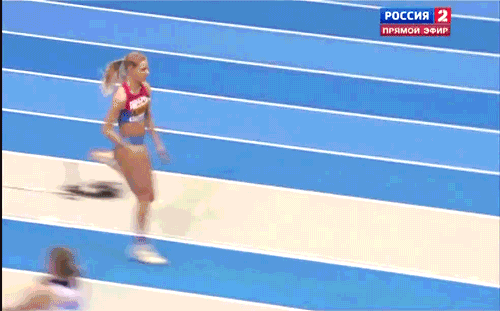
Democratic Republic of the Congo: Richard Ali A Mutu
What event will you be following most closely during this year’s Summer Olympics in Brazil?
I have to admit that the Olympic games haven’t really captivated me yet. It’s just who I am. I don’t really have any preferences because I just watch whatever comes on TV. The races, the long jump, the shot put, soccer are sometimes my favorites.
What sport has the most interesting literary tradition in your home country?
Sports, yes, and especially soccer, the biggest sport in my country, but it hasn’t yet acquired a literary tradition. From memory I can’t even name a single literary work that addresses it.
Which of your country’s athletes would make the most compelling hero/ine of a novel or subject of a biography?
I just learned that four Congolese athletes will participate in the Olympic games this year, but I don’t really know their identities or profiles. The Olympic games haven’t won a prominent place in my country. But never mind, if I must be inspired by soccer, I can cite names like: Maschak, Kidiaba, Mputu-Trésor, Mamalé, etc.
Which Olympic sport is most like your experience of writing.
I’m fascinated by the races and by soccer, but I haven’t yet considered them from a literary angle, or compared them to my experience of writing.
Richard Ali A Mutu is a novelist who writes in Lingala and French. His work was included in the Africa 39 anthology, and his book Mr. Fix-It, the first novel translated from the Lingala, is forthcoming from Phoneme Media in December 2016. He lives in Kinshasa, where he works as a lawyer and hosts a literary TV show.
Organized by Restless Books, with thanks to New Directions, Deep Vellum, FSG, Coffee House Press, Two Lines Press, Biblioasis, Europa Editions, Phoneme Media, Pushkin Press and Notting Hill Editions.
LISTEN: Paul Holdengräber talks to the poet Sjón about the importance of travel, keeping your audience awake, classical Nordic literature, the Future Library, and articulating the world.



















